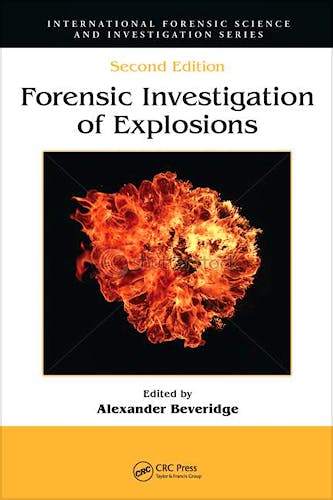

No hay productos en el carrito



Forensic Investigation of Explosions
Beveridge, A.
2ª Edición 2011
Inglés
Tapa dura
830 pags
2200 gr
null x null x null cm
ISBN 9781420087253
Editorial CRC PRESS
LIBRO IMPRESO
-5%
220,66 €209,63 €IVA incluido
212,17 €201,57 €IVA no incluido
Recíbelo en un plazo de
2 - 3 semanas
Overview
Now in its second edition, Forensic Investigation of Explosions draws on the editor’s 30 years of explosives casework experience, including his work on task forces set up to investigate major explosives incidents. Dr. Alexander Beveridge provides a broad, multidisciplinary approach, assembling the contributions of internationally recognized experts who present the definitive reference work on the subject.
Topics discussed include:
- The physics and chemistry of explosives and explosions
- The detection of hidden explosives
- The effect of explosions on structures and persons
- Aircraft sabotage investigations
- Explosion scene investigations
- Casework management
- The role of forensic scientists
- Analysis of explosives and their residues
- Forensic pathology as it relates to explosives
- Presentation of expert testimony
With nearly 40 percent more material, this new edition contains revised chapters and several new topics, including:
- A profile of casework management in the UK Forensic Explosives Laboratory, one of the world’s top labs, with a discussion of their management system, training procedures, and practical approaches to problem solving
- Properties and analysis of improvised explosives
- An examination of the Bali bombings and the use of mobile analytical techniques and mobile laboratories
- The collection, analysis, and presentation of evidence in vehicle-borne improvised explosive device cases, as evidenced in attacks on US overseas targets
This volume offers valuable information to all members of prevention and post-blast teams. Each chapter was written by an expert or experts in a specific field and provides well-referenced information underlying best practices that can be used in the field, laboratory, conference room, classroom, or courtroom.
Features
- Explores all common types of explosions, including those caused by improvised explosive devices
- Provides contributions of renowned professionals assembled by a preeminent expert in explosives and explosions
- Includes case studies from around the world
- Contains nearly 40 percent new material in the second edition
Table of contents
- The History, Development, and Characteristics of Explosives and Propellants; Robert B. Hopler
- Physics of Explosion Hazards; Bibhu Mohanty
- Detection of Hidden Explosives; Susan Hallowell, Richard Lareau, Ronald Krauss, Curtis Bell, Joshua Rubinstein, Polly Gongwer, Pamela Beresford, and James C. Weatherall
- General Protocols at the Scene of an Explosion; Jean-Yves Vermette
- Recovery of Material from the Scene of an Explosion and its Subsequent Forensic Laboratory Examination—a Team Approach; Richard A. Strobel
- The Management of Casework within the United Kingdom Forensic Explosives Laboratory; Sharon Broome and Clifford Todd
- Aircraft Explosive Sabotage Investigation; John H. Garstang
- Evidence of Explosive Damage to Materials and Structures in Air Crash Investigations; Maurice Baker, John Winn, Steve Harris, and Nigel Harrison
- Investigation of Gas Phase Explosions in Buildings; Christopher D. Foster
- Vehicle-Borne Improvised Explosive Devices; Donald J. Sachtleben
- Investigation of Pipe Bombs; Edward C. Bender and Alexander D. Beveridge
- Improvised Explosives Characteristics, Detection, and Analysis; Kirk Yeager
- Quality and the Trace Detection and Identification of Organic High Explosives; Sean Doyle
- Chromatography of Explosives; Bruce McCord, Inge Corbin, and Edward Bender
- Analysis of Explosives by Mass Spectrometry; Tsippy Tamiri and Shmuel Zitrin
- Analysis of Explosives by Infrared Spectrometry; Shmuel Zitrin and Tsippy Tamiri
- Portable Explosive Detection Instruments; Sarah Benson, Naomi Speers, and Vincent Otieno-Alego
- The Significance of Analytical Results in Explosives Investigation; Gerard T. Murray
- Forensic Pathology of Explosive Injury; Indira Kitulwatte and Michael S. Pollanen
- Presentation of Explosive Casework Evidence; James W. Jardine
- Index
Author
Dr. Alexander (Sandy) Beveridge is a consultant forensic chemist and lawyer in Vancouver, Canada. He is a fellow of the Chemical Institute of Canada and had a 30-year career in the Forensic Science Service of the Royal Canadian Mounted Police, where he headed the chemistry section in the Vancouver laboratory for many years. Sandy conducts courses and workshops on forensic investigation of explosions from practical, scientific, and legal perspectives for investigators and at academic institutions.
© 2025 Axón Librería S.L.
2.149.0